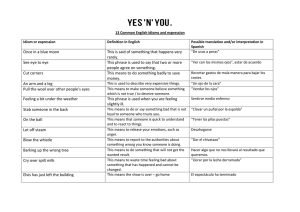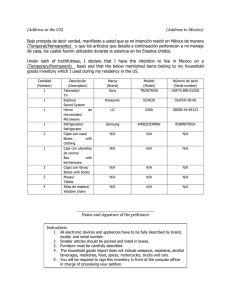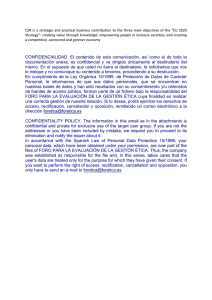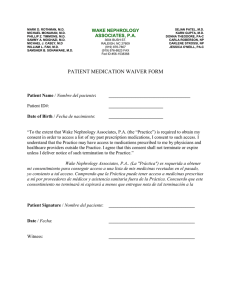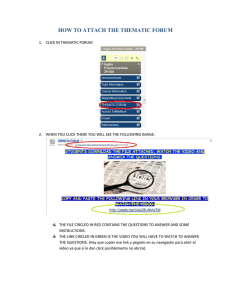Revista de Bioética y Derecho - Revistes Científiques de la
Anuncio
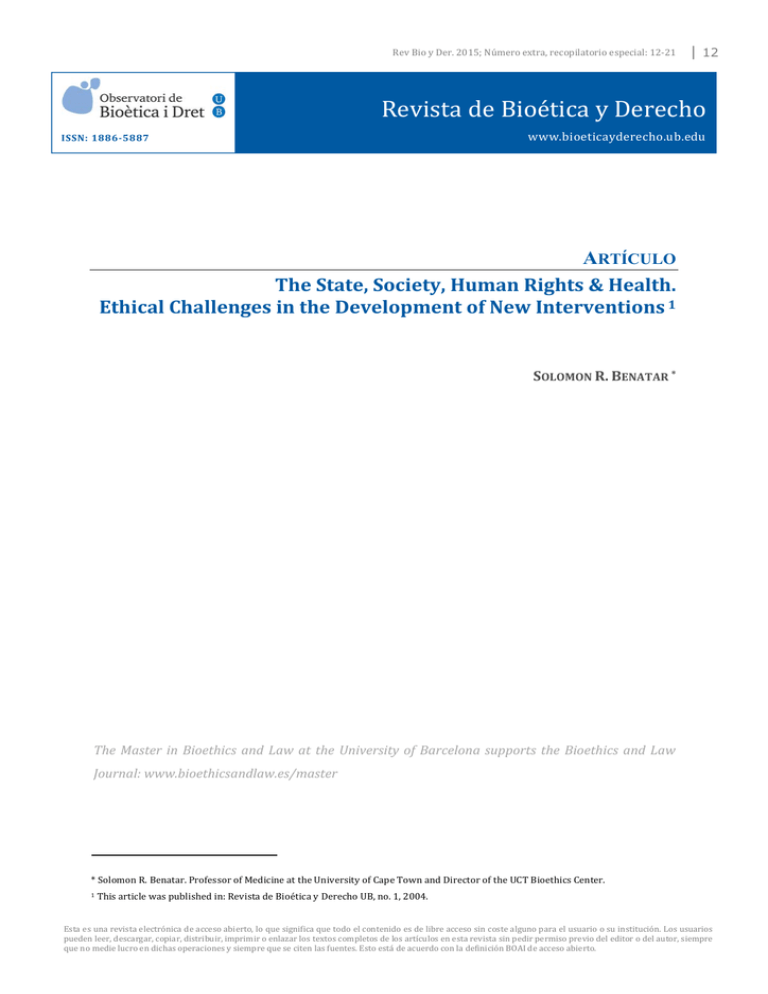
RevBioyDer.2015;Númeroextra,recopilatorioespecial:12‐21 RevistadeBioéticayDerecho | 12 www.bioeticayderecho.ub.edu ISSN:1886‐5887 ARTÍCULO TheState,Society,HumanRights&Health. EthicalChallengesintheDevelopmentofNewInterventions1 SOLOMONR.BENATAR* The Master in Bioethics and Law at the University of Barcelona supports the Bioethics and Law Journal:www.bioethicsandlaw.es/master *SolomonR.Benatar.ProfessorofMedicineattheUniversityofCapeTownandDirectoroftheUCTBioethicsCenter. 1 Thisarticlewaspublishedin:RevistadeBioéticayDerechoUB,no.1,2004. Estaesunarevistaelectrónicadeaccesoabierto,loquesignificaquetodoelcontenidoesdelibreaccesosincostealgunoparaelusuarioosuinstitución.Losusuarios puedenleer,descargar,copiar,distribuir,imprimiroenlazarlostextoscompletosdelosartículosenestarevistasinpedirpermisopreviodeleditorodelautor,siempre quenomedielucroendichasoperacionesysiemprequesecitenlasfuentes.EstoestádeacuerdoconladefiniciónBOAIdeaccesoabierto. TheState,Society,HumanRights&Health.EthicalChallengesintheDevelopmentofNewInterventions‐SolomonR.Benatar | 13 Abstract The theme of this presentation is that major impediments to the development of new interventions to improve global health comprise the combination of (1) an inadequate value system that is heavily dominated by selfish individualism, (2) an excessively downstream focus on health and (3) overriding emphasisonmarketforces.Moralimaginationisrequiredtomovebeyondthecurrentimpasseinwhich thelivesofsomeseemtobeofinfinitevaluewhilethelivesofothersareapparentlydispensable.Abroader discourse on ethics and human rights coupled to demonstration of high moral standards by influential nations could facilitate the introduction of new interventions with the prospect of greatly improving populationhealth. Keywords:globalization;values;infectiousdiseases;populationhealth;ethics;HumanRights. Introduction As the first step in attempting to resolve an ethical dilemma is to have knowledge of the facts underlyingthedilemma,Ishallbeginbybrieflyreflectingonsomefactsabouttheworldthatarerelevant totheethicalchallengesinthedevelopmentofnewinterventionstoimproveglobalhealth.Thesefactswill highlighttheglobalcontextwithinwhichover‐consumptionatoneextremeanddeprivationattheother extreme promote diseases of affluence and foster the emergence and spread of infectious diseases that threatenthehealthofwholepopulations.Ishallthenreviewsomeshortcomingsofavaluesystemthatis characterizedbystrongindividualism,dominanceofmarket‘logic’andexcessivefaithinscientificprogress andmedicalcareaspathwaystosolvingglobalhealthproblems.Thiswillleadmetosuggesttheneedfor moralimaginationinchoosingrationalwaysofaddressingupstreamforcesaffectinghealth.Aframework foranextendeddiscourseonethicsandhumanrightsisofferedasawedgetowardsdevelopingeffectivenew interventions. Somefactsinaglobalcontext Whiletheglobaleconomyhasincreasedsix‐foldduringthesecondhalfofthe20thcenturytheforces of economic globalization have perpetuated and aggravated centuries of exploitative processes that facilitate the enrichment of some people at the expense of others ‐ within and between nations. Covert erosionoftheeconomiesofmanypoorcountries,undertheimpactoftheneo‐liberaleconomicpolicies drivingglobalisation,hasobstructedrealdevelopment,andpreventedachievementofwidespreadaccess toevenbasichealthcareforbillionsofpeople.2AveragenationalpercapitaGNPhasrisentoaboveUS$ 2 FalkR.PredatoryGlobalization:acritique.CambridgeUKPolityPress,1999. Estaesunarevistaelectrónicadeaccesoabierto,loquesignificaquetodoelcontenidoesdelibreaccesosincostealgunoparaelusuarioosuinstitución.Losusuarios puedenleer,descargar,copiar,distribuir,imprimiroenlazarlostextoscompletosdelosartículosenestarevistasinpedirpermisopreviodeleditorodelautor,siempre quenomedielucroendichasoperacionesysiemprequesecitenlasfuentes.EstoestádeacuerdoconladefiniciónBOAIdeaccesoabierto. RevBioyDer.2015;Númeroextra,recopilatorioespecial:12‐21 | 14 25,000insomecountriesandremainedstaticordroppedtolessthanUS$300inothers.Thegapbetween therichest20%andthepoorest20%oftheworld’spopulationhaswidenedcontinuouslyfrom9timesat thebeginningofthecenturytoover80timesby1997.About1.2billionpeopleliveonlessthan$300ayear. Many of these live under conditions of absolute poverty defined as a condition of life so limited by malnutrition,lackofaccesstosafewaterandbasichealthcare,illiteracy,disease,squalidsurroundings, highinfantmortality,andlowlifeexpectancy. Thedebtowedtorichcountriesbythepooramountedto$2.2trillionin1997‐adebtdeveloped andperpetuatedthrougharmstradingandillconceived'developmentprojects'thatdidmoreharmthan goodandusuallybenefiteddevelopednationsmorethanthosetheywereallegedly'developing.'Suchdebt canneverberepaidandperpetuateseconomicdependenceandhumanmisery.34Foreigndevelopmentaid hasalsobeenfallingoverrecentyearsandisincreasinglydirectedtowardshumanitarianaidratherthan towardssustainabledevelopment.5 Sub‐SaharanAfricahasbeenmostadverselyaffected.Thisregionnowhas3milliondisplacedpeople, 14millionAIDSorphans,475millionAfricanlivingonlessthan$2/dayandhungeraffecting40million.The devastationresultingfromHIV/AIDSinAfricaneedstobeseeninthecontextofthreehundredyearsof slavery(1441‐1870),seventyfiveyearsofcolonialism(1885‐1960),andaColdWar(1960s–1991),that successivelydebilitatedthesub‐continent.Excitementandpridethatcamewithindependenceinthe1960s turnedtodespairwithtyrantsinthe1970sandbythe1990smanyviewedAfricancountriesas‘political andeconomicinfernos.’TheUSretreatfromAfricaaftertheColdwaraccompaniedbyongoingextraction ofresources(skilledpeople,diamondsandoil)perpetuatescenturiesofexploitation.6Sub‐SaharanAfrica's debtof$275.6billioncanneverberepaid,resultsinannualinterestpaymentsthatcanceloutthe$21.2 billionannualaiddonationtoAfrica,crippleshealthservicesandstultifiesdevelopment.7 Globalhealthchallenges Healthandpovertyareintimatelyrelated.Povertyimpairshealthandpoorhealthsustainspoverty. Growinginequalitiesintheburdenofdiseaseandmanyprematuredeathsareassociatedwiththegrowing economic disparities described. 8 About one third of all human deaths each year are poverty related. 3 PettiforA.Debt,theMostPotentFormofSlavery:ADiscussionoftheRoleofWesternLendingPoliciesinSupportingtheEconomies ofPoorCountries.London:DebtCrisisNetwork1996. 4 LabonteR,SchreckerT,SandersD,MeeusW.FatalIndifference:theG8andglobalhealth.UCTPressandInternationalDevelopment ResearchCentre.Ottawa2004. 5 LancasterC.Transformingforeignaid:UnitedStatesassistanceinthe21stcentury.InstituteforInternationalEconomics.Washington DC2000. 6 SchwabP.Africa:acontinentself‐destructs.PalgraveMacmillanNewYork,2002. 7 IntoAfrica:Specialreport.TorontoStar25MayFSectionpp1‐5(2003). 8 BenatarSR.Globaldisparitiesinhealthandhumanrights.AmerJPublicHealth.1998.88:295‐300. Estaesunarevistaelectrónicadeaccesoabierto,loquesignificaquetodoelcontenidoesdelibreaccesosincostealgunoparaelusuarioosuinstitución.Losusuarios puedenleer,descargar,copiar,distribuir,imprimiroenlazarlostextoscompletosdelosartículosenestarevistasinpedirpermisopreviodeleditorodelautor,siempre quenomedielucroendichasoperacionesysiemprequesecitenlasfuentes.EstoestádeacuerdoconladefiniciónBOAIdeaccesoabierto. TheState,Society,HumanRights&Health.EthicalChallengesintheDevelopmentofNewInterventions‐SolomonR.Benatar | 15 Moreover,disparitiesinwealtharenolongerdistributedalonga‘North’‘South’axisbutnowapplywithin mostcountries,includingtheso‐called‘highlydeveloped.’ Disparities in wealth and health are accompanied by unsustainable consumption patterns and distorted expenditure on health and medical research. Exuberant patterns of consumption of cannot be emulated by all globally and would in any event be unsustainable. Yet many view development as synonymous with increasing consumption! Global expenditure on health amounted to over $2.2 trillion/yearintheearly2000swith87%ofthisexpenditureonamere16%oftheworld’spopulationwho bearabout7%oftheglobalburdenofdiseaseexpressedindisabilityadjustedlifeyears(DALYs).Annual percapitaexpenditureonhealthcarearoundtheworldrangesfromlessthan$15toover$5000.Ofabout $70billionspentannuallyonmedicalresearch90%isdevotedtothosediseasesthataccountfor10%of the global burden of disease. Of 1393 new drugs marketed from 1975‐1999 only 16 were for tropical diseasesortuberculosis. Itwouldseemthat medicinehas somehow forgotten itspurposeandhas been hijackedtoservetheeconomicinterestsandscientificcuriosityofthemostprivileged! Itisagainstthisbackgroundthatmanyinwealthycountries(andmanyemergingmiddleclasspeople elsewhere) are increasingly suffering from diseases of affluence (obesity, type 2 diabetes and vascular diseases), while new infectious diseases, exemplified by HIV and SARS, with the potential to spread throughoutthewholeworldhavebeenemergingoverthepast25years.Thesesignsofchangeintheglobal system result from complex processes that include population growth, rapid urbanization, economic growthwithwideningdisparitiesinwealth,overandunderconsumptionoffoodandenergy,andwarand ethnicconflictwithresultingmigrationanddisplacementofmillionsofpeople.Additionalforcesinclude profoundpovertytraps,alteredrelationshipswithanimals,ecologicaldegradation,andagrowinginformal economyinwhichdrugs,peopleandsexaretradedacrosstheworld. 9Ongoingattemptstosolvethese problemswithtechniquesthatareinadequatetothetaskwillnotimprovethefuture.Afreshlookisneeded athowwelive,whatwevalueandwhatcanbedonetoimprovehumanlivesandhealthglobally Reflectionsonourvaluesystemanditsshortcomings Althoughdisparitiesinwealthandhealthareincreasinglystatedfactsaboutanunjustworld,most privileged people remain complacent and continue to pursue their own short‐term economic goals seeminglyoblivioustotheplightofmillionsofpeople,andwithlittleinsightintotheimplicationsfortheir ownfuture.Someprivilegedpeoplejustifytheircomplacencythroughbelievethatpovertyisnotthefault ofwealthycountries,butrathertheresultofbadgovernmentelsewhere,andcanbealleviatedbymarket forces.Othersmayberemorsefulbutbelievethattheproblemsassociatedwithpovertyareofsuchgreat magnitudethatthereislittlethatcanbedonetoamelioratethem.However,asPoggehasarguedbecause 9 Benatar S R. The coming catastrophe in international health: an analogy with lung cancer. International Journal (Journal of the CanadianInstituteofInternationalAffairs).2002.LV1(4)595‐610. Estaesunarevistaelectrónicadeaccesoabierto,loquesignificaquetodoelcontenidoesdelibreaccesosincostealgunoparaelusuarioosuinstitución.Losusuarios puedenleer,descargar,copiar,distribuir,imprimiroenlazarlostextoscompletosdelosartículosenestarevistasinpedirpermisopreviodeleditorodelautor,siempre quenomedielucroendichasoperacionesysiemprequesecitenlasfuentes.EstoestádeacuerdoconladefiniciónBOAIdeaccesoabierto. RevBioyDer.2015;Númeroextra,recopilatorioespecial:12‐21 | 16 wealthy nations, and by implication their citizens, are implicated in the generation and maintenance of social injustice and poverty they need to face their responsibilities to alleviate the lives of those most adverselyaffected.10 Understanding the dominant values driving behaviour in the modern world can assist our understandingofhowtheworldhasbecomesopolarised. 11Firstly,thereisgreatfaithinthebeliefthat manyoftheproblemswefacewillbeamelioratedthoughscientificprogress.Asaresultmoreandmore money and scientific effort is devoted to seeking reductionist solutions. For example, solutions to the problem of millions of starving and sick people in the world are seen in the development and use of geneticallyengineeredcropsandintheapplicationofnewgenetictechnologythroughvaccinesandnovel treatment.12Whilethepotentialvalueofsuchprogressshouldnotbeunderestimated,weshouldnotallow over‐emphasisonacquiringnewknowledgetodistractusfromapplyingtheknowledgewealreadyhave. Inparallelwithmakingscientificadvancesweshouldbealsobeseekingmeanstodistributetheexcessfood producedintheworld(muchofwhichiswasted),andtomakeessentialdrugsandhealthcaremorewidely accessible. Thisshortcomingisamplifiedbyasecondideainwhichmuchfaithisplaced:namelythateconomic growthistheanswertopoverty.Sadlynotenoughattentionisgiventohowmassiveeconomicgrowthin recentdecadeshasfailedtoalleviatepovertyintheabsenceoffairrewardforworkandgreaterjusticein theredistributionofresourcestowardsthoseinmostneed.Botheconomicgrowthandimprovedmethods ofeconomicdistributionarerequired.1314 A third ‘belief’ thataggravatesthis situation is the exclusive focus on ‘human rights’ asa modern ‘civilising’moralagenda.Whilethehumanrightsapproachhasgreatpotentialthisismuchdiminishedbya narrowfocusonuninhibitedindividualfreedomwithlittlesincereattentionpaidtothesocial,culturaland economicrightsthatareessentialforhumanflourishing. 15Commitmenttohumanrightsinitsbroadest senseisrequired. Finally, the disproportionate belief in the pursuit of short‐term self‐interest, fostered by market fundamentalism,emphasisesproductionofgoodsforconsumptionbyindividualswhilelong‐terminterests andtheproductionofpublicgoodsareundervalued.16 PoggeT.Responsibilitiesforpoverty‐relatedillhealth.EthicsandInternationalAffairs.2002;16(2)71‐79. 10 BenatarSR.HumanRightsintheBiotechnologyEra.BioMedCentral2002:www.biomedcentral.com/1472‐698X/2/3. 11 SingerPA,DaarAS.Harnessinggenomicsandbiotechnologytoimproveglobalhealthequity.Science2001;294:87‐89. 12 HongE.Globalisationandtheimpactonhealth:Athirdworldview.ThePeoples’HealthAssembly,Savar,Bangladesh,December 13 2000. PoggeT.WorldPovertyandHumanRights:CosmopolitanResponsibilitiesandReforms.PolityPress,CambridgeUK2002. 14 FalkR.Humanrightshorizons:thepursuitofjusticeinaglobalizingworld.NewYork:Routledge;2000. 15 KaulI,GrunbergI,SternMA,(Eds).GlobalPublicGoods:InternationalCo‐operationinthe21stCentury.NewYork:OxfordUniversity 16 Press(publishedforTheUnitedNationsDevelopmentProgramme(UNDP),1999. Estaesunarevistaelectrónicadeaccesoabierto,loquesignificaquetodoelcontenidoesdelibreaccesosincostealgunoparaelusuarioosuinstitución.Losusuarios puedenleer,descargar,copiar,distribuir,imprimiroenlazarlostextoscompletosdelosartículosenestarevistasinpedirpermisopreviodeleditorodelautor,siempre quenomedielucroendichasoperacionesysiemprequesecitenlasfuentes.EstoestádeacuerdoconladefiniciónBOAIdeaccesoabierto. TheState,Society,HumanRights&Health.EthicalChallengesintheDevelopmentofNewInterventions‐SolomonR.Benatar | 17 Such high profile values are underpinned by a strong sense of individualism within atrophying communitieswherethevirtuesofciviccitizenshiphavebeenerodedandhighervalueisplacedonthelives ofthosewithresourcesthanonthelivesofthepoor.17 Moral imagination: developing new values to address upstream forces affectinghealth In order to make progress it is necessary to be able to reflect deeply on the above‐mentioned upstreamforcesthatshapehumanhealthandwellbeing,andtoattempttodevelopconstructivesolutions. JonathanGlover’sdescriptionofrepeatedgenocideacrosstheworldduringthe20thcenturyremindsusof humaninhumanitytofellowhumans,andofhowdifficultitwillbetochangedominantwaysofthinking. Heconcludesthatitisonlyourmoralimagination―ourabilitytoimagineourselvesintheshoesofothers― thatcouldenableustosignificantlyalterouroutlookandactions.18Thoseofuswhohaveledprivileged livesneedtoreflectontheabominableconditionsunderwhichsomanylive,withminimalaccesstothe productsofprogress.Indoingsoweneedtoimaginefirstlyhowwewouldfareundersuchconditions,and thenwhatweshouldandcoulddoatrelativelyminimalcosttoourselvesthatcouldgreatlyenhancethe livesofmany.InthisshortpresentationIcanonlysuggestdirectionsforsuchprogressbydrawingattention toasmallselectionofrecentscholarlyworkthatprovidesguidance. PeterSinger,inanextensionofhispreviousworkonpovertyalleviation,askswhataglobalethic meansinaninterdependentworld,inwhichallarelinkedthroughexposuretothesameatmosphere,a globaleconomy,internationallawhumanrights,andaglobalcommunity.Hedoessothroughacriticaland provocative examination of climate change, the World Trade Organization’s role, the concept of human rights,theplaceforhumanitarianinterventionsandshortcomingsinforeignaid.Hedevelopsthethesisthat ‘…howwellwewillcomethroughtheeraofglobalization(perhapswhetherwecomethroughitatall)will dependonhowwerespondethicallytotheideathatweliveinoneworld.Fortherichnationsnottotakea globalethicalviewpointhaslongbeenseriouslymorallywrong.Butnowitisalso,inthelongterm,adanger totheirsecurity.19 Intheirbook“Howmightwelive?Globalethicsinthenewcentury”Booth,DunneandCoxremind usthat‘choiceliesattheheartofethics,’thathumanchoicesareneitheralwaysfreenoralwaysdetermined. History,power,context,biologyshapeourchoices,asdoourpowersofimaginationandourcapacityto WorldCitizenship:AllegiancetoHumanity.RotblatJ(Ed)Macmillan,London,1997. 17 GloverJ.Humanity:amoralhistoryofthe20thcentury.NewHaven:YaleUniversityPress,2001. 18 SingerP.Oneworld:theethicsofglobalization.YaleUniversityPress,NewHaven2002. 19 Estaesunarevistaelectrónicadeaccesoabierto,loquesignificaquetodoelcontenidoesdelibreaccesosincostealgunoparaelusuarioosuinstitución.Losusuarios puedenleer,descargar,copiar,distribuir,imprimiroenlazarlostextoscompletosdelosartículosenestarevistasinpedirpermisopreviodeleditorodelautor,siempre quenomedielucroendichasoperacionesysiemprequesecitenlasfuentes.EstoestádeacuerdoconladefiniciónBOAIdeaccesoabierto. RevBioyDer.2015;Númeroextra,recopilatorioespecial:12‐21 | 18 chooserationally.Everychoicealsohasaprice.Politicsandethicsareinseparable,likepoliticsandpower, andforeignpolicyshouldbeunderstoodasethicsinaction―thechallengebeingtobuildabetterworld.20 TheRoyalDanishForeignMinistryhassummarizedextensivedebatesonhowtobuildamoralglobal community. The major conclusion of this work is that economic globalization, propagating a model of development based solely on freedom of individuals and consumerism, is not sufficient to create a harmonious world community. Further, it is proposed that to focus on the common good will require a synthesisaroundthreesubstantivegoals(democracy,ahumanistpoliticalcultureandaneconomyoriented tomeetinghumanneedsinthewidestsense)andtwoproceduralgoals(developingacoalitionofsocial forceswithaglobalagenda,andbuildingastructureformultilateralgovernance).21 Crockerposesseveralquestionsaboutdevelopmentethicsandglobalization.Whatshouldbemeant by development? In what direction and by what means should a society ‘develop’? Who is morally responsibleforbeneficialchange?Whataretheobligations,ifany,ofrichsocietiestopoorsocieties?How shouldglobalization’simpactandpotentialbeassessedethically?22Addressingthesequestionscouldshape newwaysoflookingattheworldandpromotedeeperunderstandingofwhatitmeanstobeacitizeninan increasingly interdependent world that could embrace renewed concepts of solidarity, and concern for others,eventhoseverydistantfromourowndailylives.Newparadigmsofthinkingcouldbothpromote deeper insights into how complex systems function and facilitate novel approaches to international finances. We have attempted to address the moral challenges posed by global health considerations have identifiedseveralvaluesthatneedtobewidelypromoted.23 Respectforalllife&universalethicalprinciples HumanRights,ResponsibilitiesandNeeds Equity Freedom Democracy Environmentalethics Solidarity Wehavealsosuggestedawayforwardthroughfivetransformationalapproaches BoothK,DunneT,CoxM.Howmightwelive?Globalethicsinthenewcentury.CambridgeUniversityPress.2001. 20 RoyalDanishMinistryforForeignAffairs.Buildingaglobalcommunity:globalizationandthecommongood.Copenhagen:RDMFA, 21 2000. CrockerD.Developmentethicsandglobalization.Philosophy&PublicPolicyQuarterly.2002;22(4)13‐19. 22 BenatarSR,SouthAfrica'stransitioninaglobalizingworld:HIV/AIDSasawindowandamirror,InternationalAffairs77(April 23 2001),347‐75. Estaesunarevistaelectrónicadeaccesoabierto,loquesignificaquetodoelcontenidoesdelibreaccesosincostealgunoparaelusuarioosuinstitución.Losusuarios puedenleer,descargar,copiar,distribuir,imprimiroenlazarlostextoscompletosdelosartículosenestarevistasinpedirpermisopreviodeleditorodelautor,siempre quenomedielucroendichasoperacionesysiemprequesecitenlasfuentes.EstoestádeacuerdoconladefiniciónBOAIdeaccesoabierto. TheState,Society,HumanRights&Health.EthicalChallengesintheDevelopmentofNewInterventions‐SolomonR.Benatar | 19 Developingaglobalstateofmind Promotinglong‐termself‐interest Strikingabalancebetweenoptimismandpessimismaboutglobalizationandsolidarity Strengtheningcapacity Enhancingproductionofglobalpublicgoodsforhealth It is proposed that such progress could be initiated by expanding the discourse on ethics from interpersonal relationships, to the ethics of relationships between institutions and even to the ethics of relationshipsbetweennations. The idea that bioethics can serve as a tool for progress is supported by Wildes’ contention that bioethics is a form of social philosophy. He reminds us that industrialized countries have constructed multiplebureaucraciestoenable,governandregulatehumanlifeandthatthesestructureshelptodefine humanlifeandoftenactasaformofsocialcontrol.Becausesystemsofmedicineandhealthcaredelivery areoneofthesebureaucraticstructures,medicineisasocialinstitutionandethicalissuesinmedicineand healthcarecanonlybeaddressedadequatelyiftheyareunderstoodinthesocialcontextofthepracticeof medicine.Bioethicsprovidesalensthroughwhichtoexaminesecularsocietiesandgaininsightintopolitical authorityanditsappropriateexercise.24 Resourcesfornewglobalhealthinterventions Acknowledgmentthatresourcesneedtoberaisedformanynewinterventionsthatcouldimprove health globally has stimulated generous philanthropy. Much hope is now being placed on such recent projectsasPresidentBush’sEmergencyPlanforAIDSRelief(PEPFAR),theWorldBankMultisectorAIDS Project(MAP),theGlobalFund,theClintonFoundationandotherambitiousdonoragencies.However,while philanthropyisnecessaryitwillnotbesufficienttosustainimprovementsinglobalhealth.Severalother potentialmeansofsustainingpovertyreductionstrategiesalsoneedtobeconsidered‐‐althoughallare contentiousandwillberesisted. Firstly,ashifttowardsunderstandingthatwarisexpensive,aggravatesillhealth,andplaysarolein promotingtheemergenceofnewdiseases,couldallowsomeoftheUS$750billionspentgloballyeachyear tobedivertedtohealthpromotingactivities.25Associatedreductioninconflictandthepromotionofpeace couldcontributetosustainableprogresstowardsbetterlivesformanyandencouragenewvisionsofglobal WildesKWm.Bioethicsassocialphilosophy.SocialPhilosophy&PolicyFoundation.2002;19:113‐25. 24 KassalowJS.WhyhealthisimportanttoU.S.ForeignPolicy.CouncilonForeignRelations&MilbankMemorialFund,NewYork2001. 25 Estaesunarevistaelectrónicadeaccesoabierto,loquesignificaquetodoelcontenidoesdelibreaccesosincostealgunoparaelusuarioosuinstitución.Losusuarios puedenleer,descargar,copiar,distribuir,imprimiroenlazarlostextoscompletosdelosartículosenestarevistasinpedirpermisopreviodeleditorodelautor,siempre quenomedielucroendichasoperacionesysiemprequesecitenlasfuentes.EstoestádeacuerdoconladefiniciónBOAIdeaccesoabierto. RevBioyDer.2015;Númeroextra,recopilatorioespecial:12‐21 | 20 security.TheexampleofhowexcessiveexpenditureonmilitarizationinSouthAfricaimpededdevelopment inthatcountryissalutary.26 Secondly,acknowledgementbywealthynationsoftheirroleinsustainingpoverty,couldincrease their sense of responsibility to providing development aid in a manner that progressively reduces dependenceonphilanthropy.Sreenivasan,likeotherspreviously,suggeststhatifOECDcountriesdonated 1%oftheirGDPforforeignaidthiswouldtotal$222.25billion–asignificantadvanceoverthe$56.378 billiondonatedin1999(0.24%GDP).Hearguesthat1%isamodestamountthatisimplausibletocontest giventheamountofgoodthatcouldbeachievedwiththissum.Heexplorestheimplicationsofhowtouse suchresourcesanddealswithobjectionstohisproposalthatcouldberaisedfromtheperspectiveofideal theory.27 Acomplimentaryapproachistoreconsiderabolishingdebtsthatcanneverberepaid.Maintaining thirdworlddebtintheknowledgethatitwastoalargeextentcreatedthroughinappropriatearmstrading anddefectivedevelopmentprojectsunderminesboththehumanityofthosewhodemandrepaymentand thelivesanddignityofthethosewhoareeffectivelyenslavedbydebt.Debtreliefwillnotremovetheneed forloansandfinancialassistance,butwillrequireaccountabilityfornewloanstoensuretheirlegitimacyin thefuture.Debtcrisesneedtobeaddressedwithinthebroadercontextoftheinternationalfinancialsystem thathasbeenimposedbyfinanciallypowerfulnationsandwhomustassumesomeoftheresponsibilityfor itsadverseeffects.28 Pettiforhasdescribedthefollowingprinciplesforfairlydealingwithdebt.Firstly,acknowledgement thattotheextentthatbothpartiestoaloancanbehaverecklesslyandirresponsiblyincreatingdebtsso both should share the burden of crises that may ensue. Secondly, there should be respect for the legal principleofimpartialjudgementandthatthoseinvolvedinadisputeshouldnotbejudges.Thirdly,there should be accountability to citizens and taxpayers for debt crises that are public and involve the use of taxpayerfunds.26 Yetanotherapproachwouldbetoraiseresourcesfromnewtaxes.Globaldailyfinancialtransactions exceed $1 trillion, of which less than 10% is spent remunerating people for services rendered. The remainder is merely repackaged and resold within what has been called a `casino economy.’29 It is reasonabletosuggestthatitwouldbelegitimatetotaxsuchmonetarytransactionsforaglobaldevelopment fund.Similarly,currentconceptsoffreetradeshouldbemodifiedtoincludeenvironmentalcostsinbusiness Fine B, Rustomjee Z, The Political Economy of South Africa: From Minerals‐Energy Complex to Industrialization Johannesburg: 26 WitwatersrandUniversityPress1996. SreenivasanG.Internationaljusticeandhealth:aproposal:EthicsandInternationalAffairs.2002;16(2):81‐90. 27 PetifforA.Resolvinginternationaldebtcrisesfairly.EthicsandInternationalAffairs,2003;17(2)2‐9. 28 www.globalexchange.org;SusanStrange,CasinoCapitalism,Oxford:Blackwell1986. 29 Estaesunarevistaelectrónicadeaccesoabierto,loquesignificaquetodoelcontenidoesdelibreaccesosincostealgunoparaelusuarioosuinstitución.Losusuarios puedenleer,descargar,copiar,distribuir,imprimiroenlazarlostextoscompletosdelosartículosenestarevistasinpedirpermisopreviodeleditorodelautor,siempre quenomedielucroendichasoperacionesysiemprequesecitenlasfuentes.EstoestádeacuerdoconladefiniciónBOAIdeaccesoabierto. TheState,Society,HumanRights&Health.EthicalChallengesintheDevelopmentofNewInterventions‐SolomonR.Benatar | 21 activities.Thiswouldindicateacceptancethattherecannotbefreeaccesstothe`naturalcommons'tothe disadvantageofdistantotherselsewhereorfuturegenerations.30 Finally,thepromotionoffairtraderuleswouldgenerateverysignificantresourcesfordeveloping countriesbyallowingthemtoselltheirproductsatpricesthatwouldincreasetheirindependence.Annual farmingsubsidiesofUS$350billioninindustrialisedcountries31andtradeprotectionismcostdeveloping countries$50billionannuallyinpotentialexportearnings.32 SettingaMoralExample Aspowerfulasscience,themarket,humanrightsandothermorallanguagesmaybe,theinfluenceof wealthycountriessettingamoralexampleispotentiallymorepowerful.Neglectofthepoorwithinrich societies,perpetuationofunsustainableconsumeristlifestyles,lackofuniversalaccesstohealthcarewithin theUnitedStates,andthecontinuingproductionofweaponsofmassdestruction,33arepoorexamplesfor other nations. Trends in aid donations to developing countries reveal that progressively smaller proportionsofashrinkingtotalarebeingspentonrealdevelopmentwhileagrowingproportionisspent onhumanitarianassistance4for‘man‐made’tragediesthatcouldbeprevented. Conclusions Globalhealthdisparitiesposethegreatestpotentialsecurityrisktohealthandlivesofall.Moreover, itisnotonlythesedisparitiesintheirownrightthatposechallengestodevelopmentofnewinterventions, butmoreparticularlyitisthoseforcesthatgeneratethedisparitiesthatposethemajorimpedimentsto improvementsinglobalhealth.Upstreamcausesshouldbeunderstoodandacknowledged,thepoliticalwill musteredtotakeappropriateactionandmechanismsforsuchactiondefinedandactedon.Thisagenda couldallowscientificprogresstobeaccompaniedbymoralprogress,andremovalofimpedimentstonew interventionsthatcouldimproveglobalhealth. LouN,GleesonB,SocietyandNature,London:Routledge1998. 30 ElliottL.Don’tlettherichcrypooroveraid.GuardianWeekly,May22‐28.Pp12.2003. 31 KristofND.WhatdidyoudoduringtheAfricanHolocaust?NewYorkTimes.May27,A252003. 32 SivardR.WorldMilitaryandSocialExpenditure16thEd,WashingtonDC:WorldPrioritiesPress1996. 33 Estaesunarevistaelectrónicadeaccesoabierto,loquesignificaquetodoelcontenidoesdelibreaccesosincostealgunoparaelusuarioosuinstitución.Losusuarios puedenleer,descargar,copiar,distribuir,imprimiroenlazarlostextoscompletosdelosartículosenestarevistasinpedirpermisopreviodeleditorodelautor,siempre quenomedielucroendichasoperacionesysiemprequesecitenlasfuentes.EstoestádeacuerdoconladefiniciónBOAIdeaccesoabierto.



